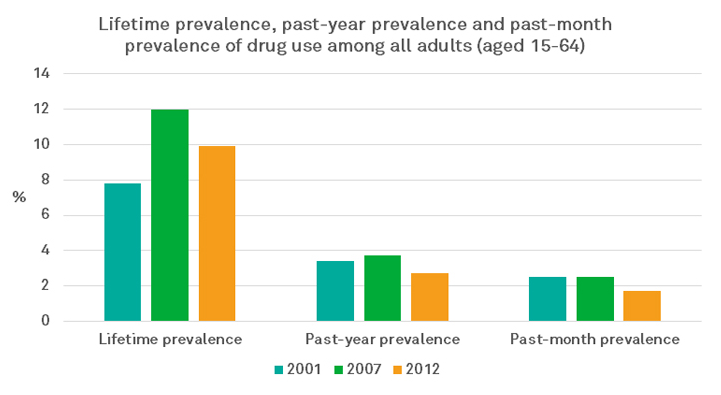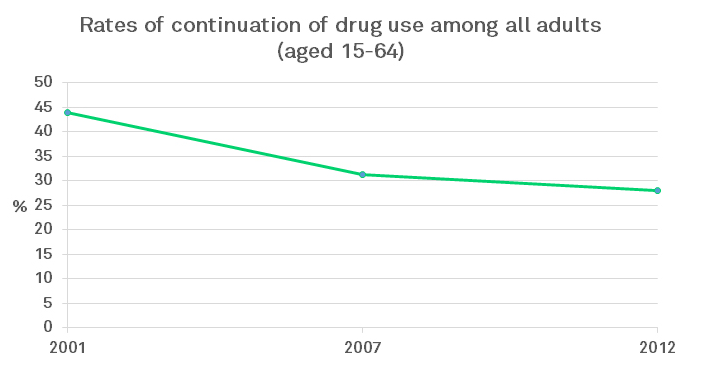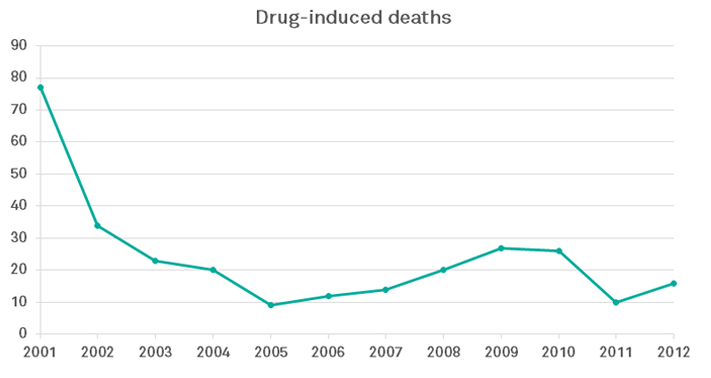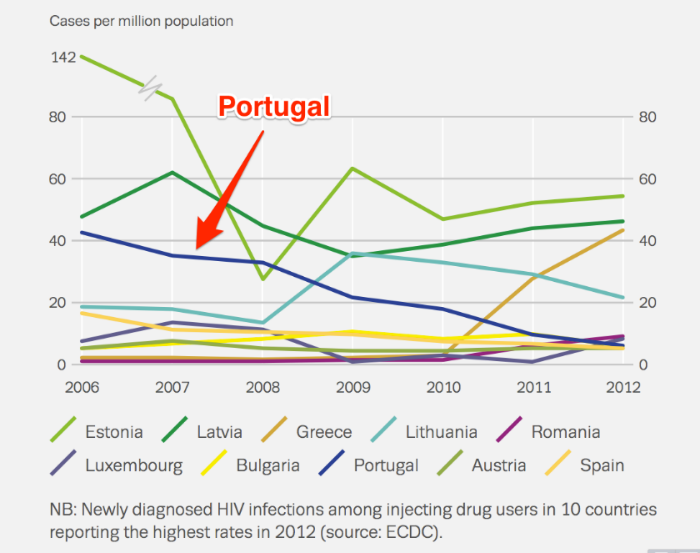This section allows you to view all posts made by this member. Note that you can only see posts made in areas you currently have access to.
Topics - cxfhvxgkcf-56:7
61
« on: November 06, 2015, 09:02:22 PM »
http://mic.com/articles/110344/14-years-after-portugal-decriminalized-all-drugs-here-s-what-s-happening#.11WykNgUlIn 2001, the Portuguese government did something that the United States would find entirely alien. After many years of waging a fierce war on drugs, it decided to flip its strategy entirely: It decriminalized them all. If someone is found in the possession of less than a 10-day supply of anything from marijuana to heroin, he or she is sent to a three-person Commission for the Dissuasion of Drug Addiction, typically made up of a lawyer, a doctor and a social worker. The commission recommends treatment or a minor fine; otherwise, the person is sent off without any penalty. A vast majority of the time, there is no penalty. Fourteen years after decriminalization, Portugal has not been run into the ground by a nation of drug addicts. In fact, by many measures, it's doing far better than it was before. The background: In 1974, the dictatorship that had isolated Portugal from the rest of the world for nearly half a century came to an end. The Carnation Revolution was a bloodless military-led coup that sparked a tumultuous transition from authoritarianism to democracy and a society-wide struggle to define a new Portuguese nation. The newfound freedom led to a raucous attitude of experimentalism toward politics and economy and, as it turned out, hard drugs. Portugal's dictatorship had insulated it from the drug culture that had swept much of the Western world earlier in the 20th century, but the coup changed everything. After the revolution, Portugal gave up its colonies, and colonists and soldiers returned to the country with a variety of drugs. Borders opened up and travel and exchange were made far easier. Located on the westernmost tip of the continent, the country was a natural gateway for trafficking across the continent. Drug use became part of the culture of liberation, and the use of hard narcotics became popular. Eventually, it got out of hand, and drug use became a crisis. At first, the government responded to it as the United States is all too familiar with: a conservative cultural backlash that vilified drug use and a harsh, punitive set of policies led by the criminal justice system. Throughout the 1980s, Portugal tried this approach, but to no avail: By 1999, nearly 1% of the population was addicted to heroin, and drug-related AIDS deaths in the country were the highest in the European Union, according to the New Yorker. But by 2001, the country decided to decriminalize possession and use of drugs, and the results have been remarkable. What's gotten better? In terms of usage rate and health, the data show that Portugal has by no means plunged into a drug crisis. As this chart from Transform Drug Policy Foundation shows, the proportion of the population that reports having used drugs at some point saw an initial increase after decriminalization, but then a decline:  (Lifetime prevalence means the percentage of people who report having used a drug at some point in their life, past-year prevalence indicates having used within the last year, and past-month prevalence means those who've used within the last month. Generally speaking, the shorter the time frame, the more reliable the measure.) Drug use has declined overall among the 15- to 24-year-old population, those most at risk of initiating drug use, according to Transform. There has also been a decline in the percentage of the population who have ever used a drug and then continue to do so:  Drug-induced deaths have decreased steeply, as this Transform chart shows:  HIV infection rates among injecting drug users have been reduced at a steady pace, and has become a more manageable problem in the context of other countries with high rates, as can be seen in this chart from a 2014 report by the European Monitoring Center for Drugs and Drug Addiction Policy:  And a widely cited study published in 2010 in the British Journal of Criminology found that after decriminalization, Portugal saw a decrease in imprisonment on drug-related charges alongside a surge in visits to health clinics that deal with addiction and disease. Not a cure but certainly not a disaster: Many advocates for decriminalizing or legalizing illicit drugs around the world have gloried in Portugal's success. They point to its effectiveness as an unambiguous sign that decriminalization works. But some social scientists have cautioned against attributing all the numbers to decriminalization itself, as there are other factors at play in the national decrease in overdoses, disease and usage. At the turn of the millennium, Portugal shifted drug control from the Justice Department to the Ministry of Health and instituted a robust public health model for treating hard drug addiction. It also expanded the welfare system in the form of a guaranteed minimum income. Changes in the material and health resources for at-risk populations for the past decade are a major factor in evaluating the evolution of Portugal's drug situation. Alex Stevens, a professor of criminal justice at the University of Kent and co-author of the aforementioned criminology article, thinks the global community should be measured in its takeaways from Portugal. "The main lesson to learn decriminalizing drugs doesn't necessarily lead to disaster, and it does free up resources for more effective responses to drug-related problems," Stevens told Mic. The road ahead: As Portugal faces a precarious financial situation, there are risks that the country could divest from its health services that are so vital in keeping the addicted community as healthy as possible and more likely to re-enter sobriety. That would be a shame for a country that has illustrated so effectively that treating drug addiction as a moral problem — rather than a health problem — is a dead end. In a 2011 New Yorker article discussing how Portugal has fared since decriminalizing, the author spoke with a doctor who discussed the vans that patrol cities with chemical alternatives to the hard drugs that addicts are trying to wean themselves off of. The doctor reflected on the spectacle of people lining up at the van, still slaves of addiction, but defended the act: "Perhaps it is a national failing, but I prefer moderate hope and some likelihood of success to the dream of perfection and the promise of failure."
62
« on: November 06, 2015, 08:16:54 PM »
you make a mockery of shitposting by spamming shitty shitposts
it's an art form you fucking degenerate nigger kikes
63
« on: November 04, 2015, 09:32:22 PM »
64
« on: November 04, 2015, 11:35:50 AM »
http://www.forbes.com/sites/emmawoollacott/2015/11/04/uk-set-for-russia-style-bulk-surveillance/Well, Google and Facebook can breathe easy: the UK government has graciously decided not to force them to introduce backdoors. Nor will Apple have to give up end-to-end encryption.
Prospects aren’t quite so rosy for the British public, though, who despite these ‘concessions’ look set for a level of surveillance that’s unprecedented anywhere in the western world.
Much of what the draft Investigatory Powers Bill contains simply legitimizes what the security services have been doing already – and until recently, in secret. Thus, they’re specifically permitted to carry out the bulk collection of large volumes of personal communications data; and, along with the police, can hack into and bug computers and phones.
Alongside this, the draft bill orders internet service providers to capture the address of every website visited by every one of their customers. They must then store the data for 12 months and hand it over when ordered to the police, security services and other public bodies.
And you read that right: that’s every single internet user in the UK, whether or not they’re even suspected of any offence.
Announcing the bill, home secretary Theresa May said she’d ‘engaged’ with civil liberties groups before preparing the draft. It’s far from clear, though, how this engagement affected the final result – which goes way beyond anything seen outside the world’s most repressive regimes.
After a quick read, Open Rights Group executive director Jim Killock says the bill looks like ‘an attempt to grab even more intrusive surveillance powers’, and that it ‘gives the state intrusive hacking powers that can carry risks for everyone’s internet security’.,
Bizarrely, announcing the bill in parliament, May actually cited the high number of hacking attacks in the UK as a factor in support of the bill.
But given the recent hacking of TalkTalk and Vodafone, in which the user details of thousands of people were exposed, it’s not exactly easy to trust service providers to keep data safe. If that data is now to include, say, peoples’ visits to porn sites, it could make the aftermath of the Ashley Madison hack look pretty.
The bill does contain a small sop to civil liberties, in the form of a promise that the data will only be accessed with a judge’s order – unless it’s ‘urgent’, that is. And there’s one group allowed to retain privacy, with their records only accessed with the prime minister’s personal approval: members of Parliament themselves.
There is some hope, at least, that the bill won’t actually make it into law. It will now go to a parliamentary committee, which will make recommendations after taking evidence from third parties. And it was this stage of proceedings that scuppered the government’s last attempt at a ‘snoopers’ charter’, thrown out in 2012.
There are also big questions over the legality of blanket retention of data without suspicion.
Until recently, the EU’s Data Retention Directive obliged European telecoms companies to collect and retain location and traffic data for between six months and two years.
Last year, though, the European Court of Justice (CJEU) threw this out, ruling that it severely interfered with the fundamental rights to respect for private life and the protection of personal data.
While the UK government bypassed this ruling by rushing the Data Retention and Investigatory Powers Act (DRIPA) through Parliament, the act has recently been found unlawful by the High Court. And while the government is appealing, it certainly can’t count on being permitted to retain blanket collection without suspicion – let alone extending it far further.
David Cameron, though, has described this bill as ‘one of the most important pieces of legislation’ of this parliament – in other words, he’s not going to give up easily. And if he succeeds, what next? He’s repeatedly said that he doesn’t want to give terrorists a ‘safe space to communicate’: how long before he’s monitoring your living room too?
65
« on: November 04, 2015, 11:23:56 AM »
http://www.slate.com/articles/news_and_politics/politics/2015/11/hillary_clinton_keeps_smearing_bernie_sanders_as_a_sexist_now_she_is_reaching.2.htmlOn Oct. 23, Hillary Clinton opened a new front against Sen. Bernie Sanders: She framed him as a sexist. Clinton took a phrase Sanders had routinely used in talking about gun violence—that “shouting” wouldn’t solve the problem—and suggested that he had aimed it at her because “when women talk, some people think we’re shouting.”
Several journalists called out Clinton for this smear. But she refuses to withdraw it. Instead, her campaign officials and supporters have escalated the attack. And now, Clinton is adding a new dimension to the controversy: race.
Some feminists applauded Clinton’s initial zinger. “Hillary Baits Bernie Beautifully,” said a headline in Salon. Another article accused Sanders of “old-fashioned tone policing and dogwhistling about women’s shrillness.” On Oct. 27, Stephanie Schriock, the president of Emily’s List, conceded that Sanders hadn’t singled out Clinton. But Schriock insisted that Sanders “was referring to a lot of folks who have been very adamant about [guns] and a lot of women who have been leading the fight on gun violence across the country. And I do think that is disrespectful.”
The next day, Clinton sat down for an interview in New Hampshire. Josh McElveen of WMUR asked her about Sanders: “Do you believe that he’s attacking you based solely on your gender?” Clinton replied: “When I heard him say that people should stop shouting about guns, I didn’t think I was shouting. I thought I was making a very strong case. … And I’m not going to be silenced.” McElveen followed up: “But as far as the implication that Bernie Sanders is sexist—you wouldn’t go that far?” Clinton shrugged, smiled, and sidestepped the question. “I said what I had to say about it,” she concluded.
That day, Bloomberg Politics published an article in which Sanders’ campaign manager, Jeff Weaver, joked that Clinton would “make a great vice president” for Sanders. Weaver offered to interview her for the job. As Jonathan Chait has pointed out, that’s a standard put-down among candidates: Clinton said the same thing about Barack Obama in 2008. But when Weaver tried it on Clinton, her supporters erupted. Christine Quinn, a Clinton backer, accused the Sanders campaign of sexism. Quinn pointed at Sanders himself: “I’m stunned that a man like Bernie Sanders, who has clearly committed his life to making the country a better place, would get sucked into this very dangerous rhetoric, which perpetuates sexist and misogynistic stereotypes.”
Clinton used her initial sound bite—“when women talk, some people think we’re shouting”—in at least six places. She posted it on Twitter, Facebook, and her campaign website. She also delivered it in three speeches: in Washington, D.C., and Alexandria, Virginia, on Oct. 23, and in Des Moines, Iowa, on Oct. 24. After that, I didn’t hear it, except in her interview in New Hampshire. I thought she might be done with it. But then, on Friday, she raised a new issue.
Clinton was in Charleston, South Carolina, addressing the local NAACP. She spoke against a tragic background: the massacre of nine black people in a Charleston church by a white racist. Naturally, she talked about guns. But she added a new line: “There are some who say that this [gun violence] is an urban problem. Sometimes what they mean by that is: It’s a black problem. But it’s not. It’s not black, it’s not urban. It’s a deep, profound challenge to who we are.”
The idea that urban is code for black has been around a long time. It’s often true. And it’s not necessarily derogatory: In 1920, the National League on Urban Conditions Among Negroes shortened its name to the National Urban League. But why would Clinton suddenly bring up, in a damning tone, people who call guns an urban problem? Who was she talking about? It can’t be the Republican presidential candidates: They haven’t disagreed enough to debate the issue at that level of granularity. The only recent forum in which guns have been discussed as an urban concern is the forum that inspired Clinton’s initial accusation of sexism: the Oct. 13 Democratic debate in Las Vegas. Pull up the transcript of that debate, search for “urban,” and you’ll see whom Clinton is talking about: Sanders.
In fact, it’s from the same moments of the debate that Clinton had already seized on. In the debate, Sanders began by saying, “As a senator from a rural state, what I can tell Secretary Clinton [is] that all the shouting in the world is not going to do what I would hope all of us want.” A couple of minutes later, Sanders told former Maryland Gov. Martin O’Malley: “We can raise our voices, but I come from a rural state, and the views on gun control in rural states are different than in urban states, whether we like it or not.” O’Malley insisted that the issue was “not about rural and urban.” Sanders replied: “It’s exactly about rural.” Only one other candidate used the word “urban” during the debate: former Virginia Sen. Jim Webb. A week later, on Oct. 20, Webb quit the campaign. So when Clinton, on Friday, spoke scathingly of people who call guns an “urban problem” but mean it’s a “black problem,” it’s obvious to whom she was referring.
This line of attack is rich in irony. When Clinton ran for president in 2008, she explicitly used race against Obama. She told USA Today that she should be the Democratic nominee because “I have a much broader base to build a winning coalition on.” Clinton cited an article that, in her words, showed “how Sen. Obama’s support among working, hard-working Americans, white Americans, is weakening again, and how whites in [Indiana and Pennsylvania] who had not completed college were supporting me.” A reporter asked Clinton whether this argument was racially divisive. “These are the people you have to win if you’re a Democrat,” Clinton replied dismissively. “Everybody knows that.”
Now Clinton accuses others of playing the race card. In Charleston, she told the NAACP, “Some candidates talk in coded racial language about ‘free stuff,’ about ‘takers’ and ‘losers.’ And boy, are they quick to demonize President Obama. This kind of talk has no place in our politics.”
Clinton, too, speaks in code. But in this election, her coded phrases—“some people think we’re shouting,” “some who say that this is an urban problem”—aren’t designed to veil racism. They’re designed to veil her meritless insinuations that her Democratic opponent is sexist and racist. You can argue, based on power or privilege, that playing the race card or sex card from the left isn’t as bad as playing it from the right. But even if you believe that, Clinton’s smears bring discredit on the whole idea of bigotry. If accusations of misogyny and racism are casually thrown at Sanders, voters will conclude that these terms are just rhetoric.
Seven years ago, when Clinton’s own campaign was accused of prejudice, her husband was outraged. “She did not play the race card, but they did,” Bill Clinton said of the Obama campaign. The former president went on: “This is almost like, once you accuse somebody of racism or bigotry or something, the facts become irrelevant.” Three months later, Mr. Clinton was still fuming. “They played the race card on me, and we now know from memos from the campaign and everything that they planned to do it all along,” he protested. “This was used out of context and twisted for political purposes by the Obama campaign to try to breed resentment elsewhere. … You really got to go some to try to portray me as a racist.”
Now Hillary Clinton is doing to Sanders what her husband said was done to her. She’s taking Sanders’ remarks out of context and twisting them to breed resentment. You’ve got to twist the facts pretty hard to portray Sanders as a racist or sexist. But politically, it’s easy, because once you start throwing around charges of bigotry, the facts become irrelevant. You’re just another beautiful baiter. And you won’t be silenced. So the Democrat smearing begins
66
« on: November 03, 2015, 12:50:41 PM »
I've been doing a lot of reading on this lately and I suppose its relevant to current events those being the mass influx of immigrants to Europe from the war torn Middle East. It seems this is causing a lot of nationalist far right political parties to become increasingly popular. The National Front in France which is one of the most prominent far right parties in Europe is becoming increasingly popular and is predicted to lead the first round of 2017 presidential elections. They also won 24 or France's 47 seats in the 2014 European Parliament election. A far right win for a country that is a leader in the EU could be troubling and cause more far right parties to win in other countries. Some of the stances of the NF: In 2002, Jean-Marie Le Pen campaigned on the law and order policies of "zero tolerance", harsher sentencing, increased prison capacity, as well as a referendum on re-introducing the death penalty. In its 2001 program, the party linked the breakdown of law and order to immigration, deeming immigration a "mortal threat to civil peace in France." Under her leadership, Marine Le Pen has been more clear in her support for protectionism, while she has criticised globalism and capitalism for certain industries. She has been characterized as a proponent of letting the government take care of health, education, transportation, banking and energy.
Another example of far right parties finding success in Europe is Poland's Law and Justice party winning just last month. The party is extremely anti-immigrant while remaining pro-EU on the terms that it benefits Poland rather than Poland benefiting the EU. Some of PiS's policies could also be considered authoritarian in nature as seen here: PiS is critical of Poland’s current liberal-democratic model of government and its 2010 draft of a new constitution envisions changes that would strengthen the presidency, erode checks and balances (including ability of the Constitutional Tribunal to declare laws unconstitutional), weaken independence of the judiciary and the central bank, and introduce various populist, plebiscitarian elements (e.g., president-initiated referendums that could be used to strike down legislation passed by parliament).
It doesn't stop there. Hungary's current party in power, Fidesz, led by Viktor Orbán is what many would consider far right in nature. Although Jobbik is recognized as the far right party in Hungary Fidesz probably has a more radical discourse (though not ideology) than Jobbik. Over the past few years, Orbán has made many high-profile statements that go well beyond contemporary European conservatism. For example, earlier this year he called for the reintroduction of the death penalty and for the building of “work camps” for immigrants. And his words are often followed by equally controversial actions. For instance, Hungary has started building a fence with Serbia to keep immigrants out.
Still there are many other examples of far right parties just narrowly losing in recent elections in various countries and their popularity is on the rise. The Freedom Party in Austria, led by the controversial former dentist Heinz-Christian Strache, won a considerable 32 percent of the vote in regional elections.Earlier this year in Denmark the DPP (Danish People's Party took more than 21% of the vote and 37 seats in the country’s 179-seat parliament.Greece's neo-fascist party, Golden Dawn, came in third in general elections earlier this year with 7% of the vote. Sure that sounds like a small percentage but that amounts to 500,000 voters and 18 MP seats. That kind of support for one of Europe's most violent far right groups is alarming indeed. Sweden, one of Europe's most pro-immigrant countries, is also seeing a rise in popularity of their own far-right party the Sweden Democrats. The Sweden Democrats have surged in the polls from 5.7 per cent in 2010 to 12.9 per cent at last year’s elections and a poll by Sentio Research this month put the party at 26.5 per cent.
The causes of all this rise in popularity for the far right isn't just the immigration crisis though it is by far the primary. The sanctions by the EU and US against Russia are hurting Europe economically, much more than the US. Russia is America’s 23rd largest trade partner, but Europe’s third. Die Welt reports that sanctions on Russia could eventually cost Europe $114 billion and up to 2 million jobs. Putin has been playing this factor very well by his current involvement in Syria. Of course he wants to assert a presence in the Middle East but also he wants to show Europeans that Russia can help stabilize Syria, halting the flow of refugees into Europe. All Putin needs is one far-right party to assume power and decide that their country’s economic well-being is more important than punishing Russia. Not all far right parties are pro-Russian necessarily. For instance France's NF is very pro-Russian while Poland's PiS is very ant-Russian. It's a sentiment shared by many but not all far right parties. Now many of these far right parties aren't necessarily worthy of that very scary "fascist" label. While they do support staunch anti-immigration policies, protective tariffs, some very un-European policies like the death penalty, and for some even radical policies like immigrant work camps they still lack many of the authoritarian aspects synonymous of fascism. So I don't want anyone to walk away from this thinking that there are several Nazi type dictatorships on the rise in Europe. That doesn't really appear to be the case at all. While all fascists are nationalists, not all nationalists are fascists and that's an important thing to remember. So in light of these statistics are we in danger of seeing the far right take over in Europe? I feel like they are and a lot of people are ignoring it. I simply think the issue needs more attention on the world stage. (Also I really welcome some criticism if I made any mistakes, namely Flee, because while I've done quite a lot of reading on this I still feel weak on the subject.)
67
« on: November 03, 2015, 12:28:46 AM »
 >tfw the democraps win
68
« on: November 03, 2015, 12:27:39 AM »
"white guys have the money.black guys have the dick.sexist patriarchy thinks that us girls have to pick!!!" GAS THE KIKES RACE WAR NOW!!!!!
69
« on: November 02, 2015, 07:59:16 PM »
70
« on: November 02, 2015, 05:49:57 PM »
71
« on: October 30, 2015, 12:34:33 PM »
https://www.washingtonpost.com/news/morning-mix/wp/2015/10/30/the-ghostly-explanation-for-how-a-mans-unborn-twin-fathered-his-child/The Washington state couple (whose names have been withheld for privacy reasons) initially thought that their child, conceived in vitro, had been created with a stranger’s sperm.
What else could explain their discovery last year that their newborn son’s blood type didn’t match either of theirs? Or the subsequent paternity test confirming that the man of the pair was not the child’s biological father? The mother became pregnant through artificial insemination, so it only made sense that the fertility clinic had made a terrible mistake and used the wrong sperm sample.
Except staff at the clinic told them that the 34-year-old father was the only white man who had donated sperm at the facility on the day the child, who appears white, was conceived, Buzzfeed reports.
In some ways, though, the couple was right. Their child did bear the DNA of another man — but he wasn’t quite a stranger, at least in biological terms.
The DNA matched that of the man’s unborn twin, essentially making the man the biological uncle of his own wife’s child.
The couple was understandably confused when they received this explanation from genetic testing company 23andMe and Barry Starr, a Stanford University geneticist who runs the “Ask a Geneticist” blog on which the new parents first posed their query.
The familial definitions are a matter of genetic makeup. Starr told TIME: “It just leapt out at me: uncle. If it was a parent-child relationship, you would see 50 percent of the DNA related. If it is an uncle to a niece or nephew, it’s 25 percent related. This man and his son are 25 percent related.”
According to Starr’s research into the matter, the baby’s mysterious origins are a product of the genetic phenomenon of “chimerism,” in which one fetus that dies early in pregnancy is subsequently “absorbed” by the remaining sibling. This process, called “vanishing twin phenomenon,” is believed to be much more common than people think: a 1998 study found that one out of every eight single births begins as a twin or other multiple at conception.
The vanishing twin effect occurs when, instead of producing twins, two zygotes fuse into one. Starr believes that this is what happened to the Washington man, who ostensibly absorbed some of his fraternal twin’s cells while in the womb, becoming a “chimera” — a spectral blend — of himself and his unborn brother.
The term comes from Greek mythology, which tells the story of a fire-breathing hybrid creature, the Chimera (or “Chimaera”), comprised of a goat’s head coming out of a lion’s back and a dragon’s head coming out of its tail.
The name today is generally used to refer to the fantastical and imaginary, though, as it turns out, chimeras in biological science are both astonishing and real.
Previous chimera cases have been found in mothers who retained some of the cells of their children. Per the Daily Beast, chimeras can also arise through blood transfusions or organ transplants.
The Washington couple’s case is extraordinary because the cells that the man took from his twin were germline cells — cells with the capacity to grow into eggs or sperm, TIME reports. Thus, the man’s sperm took on a mixture of his DNA and his brother’s, with his immune system recognizing both as “the self” because the absorption of cells occurred while the man was still inside the womb.
As a result, 90 percent of the man’s sperm is comprised of his own DNA, and 10 percent is that of his twin. The man has another child whose DNA does match his.
“What is interesting is to explore in what way this affects the person’s feeling of identity,” Columbia University stem cell scientist Dieter Egli told TIME. “These are questions that are more important as we start to use cell therapies and cell transplantations as well.”
In the U.S., over 382,000 legal paternity tests are ordered annually, usually with the most unexpected results pointing to infidelity. In this couple’s case, however, their test results yielded even more perplexing questions about the man’s relationship to his DNA, his unborn twin (who is also a part of him) and the child to whom he is biologically an uncle even though he or she was in many ways created with his sperm.
The implications of this conclusion are slightly eerie, as if to say that the man’s unborn sibling continues to haunt his body — and now lives on through a child who shares more physical traits with the twin who never took a single breath than with him.
But while all this sounds like a salacious romance-turned-science-fiction plot, most people just aren’t aware of the chimeras among them, or even if they might be chimeras themselves.
The man in this case has two-toned skin, a common mark of chimerism. As a child, he was so embarrassed by the marked difference in shades on his body that he told people he was a burn victim, according to Medical Daily.
Other chimeras may have two different eye colors, or even two sets of sex organs.
The medical curiosity is perhaps even stranger when it manifests in a woman, as Lydia Fairchild (also of Washington state) learned in 2003 after a test revealed that she was not her children’s biological mother.
The results were inexplicable, the Daily Beast details, as Fairchild insisted that she had given birth to all her kids. She was applying for public assistance at the time, and the state accused her of fraud and threatened to have her children removed by child services.
The court only believed her after a court officer was present at the birth of her third child, after which an immediate DNA test revealed that Fairchild wasn’t the biological mother of that newborn, either. But, after her case was championed by an attorney determined to get to the bottom of her medical mystery, it was discovered that Fairchild was a chimera who carried the DNA of her demised twin. And it was that maternal DNA that had been passed onto the three children she had borne.
Starr’s statement notes that while chimerism causing confused paternity tests have historically been quite unusual, it may become increasingly common as more people use fertility clinics to conceive. These assisted reproductive technologies raise the chances of one pregnancy resulting in multiple births — or, sometimes, one birth that happens to contain a chimeric, unborn parent of the living sibling’s future child. How do you explain to your child that your both his uncle and father?
72
« on: October 29, 2015, 01:45:36 PM »
That's right folks. Our hate only makes the Jews more powerful. Let me put it this way: Who wants to destroy the Jews? Who wants to grind their bones into the dust? And who wants to see them rise again? Wealthier, more successful, powerful, cultured, more intelligent than ever? Then you know what we have to do? We have to love 'em. What? Did he say ''Love the Jews''? It's strange, I know. But with these people, nothing is simple. The Jew says all he wants is to be left alone to study his Torah... do a little business... fornicate with his oversexed wife,but it's not true. He wants to be hated. He longs for our scorn. He clings to it, as if it were the very core of his being. If Hitler had not existed, the Jews would've invented him. For without such hatred, the so-called Chosen People would vanish from the earth. And this reveals a terrible truth and the crux of our problem as Nazis. The worse the Jews are treated, the stronger they become. Egyptian slavery made them a nation. The pogroms hardened them. Auschwitz gave birth to the state of Israel. Suffering, it seems, is the very crucible of their genius. So, if the Jews are,as one of their own has said... a people who will not take ''yes'' for an answer... let us say ''yes'' to them. They thrive on opposition. Let us cease to oppose them. The only way to annihilate this insidious people once and for all... is to open our arms, invite them into our homes... and embrace them. Only then will they vanish into assimilation, normality and love. But we cannot pretend. The Jew is nothing if not clever. He will see through hypocrisy and condescension. To destroy him, we must love him sincerely. If the Jews are strengthened by hate, wouldn't this... destruction that you speak of, whether it's by love or any other means... wouldn't that make them more powerful than they are already? Yes. lnfinitely more. They would become as God. It's the Jews' destiny to be annihilated so they can be deified. Jesus understood this perfectly. And look what was accomplished there with the death of just one enlightened Jew. Imagine what would happen if we killed them all."
73
« on: October 29, 2015, 01:35:23 PM »
Yes, that means we're talking down to you
74
« on: October 29, 2015, 12:33:57 PM »
>tfw the average crust punk fan The fanbase is basically entirely made up of homeless, vegan, pseudo-hippies who dress "crusty." Its disappointing because crust punk is a great subgenre.
75
« on: October 29, 2015, 10:30:48 AM »
It seems like everyday I get 20 or 30 emails saying something to the effect of "Irrelevant organization X is having an irrelevant bakesale. Come and buy shit." I'm getting pretty tired of it honesty.
This happen to anyone else?
76
« on: October 29, 2015, 10:22:15 AM »
ROCK MUSIC WAS ONLY GOOD MUSIC LELELE xDDDD
ALL NEW MUSIC SUCKS LOL!!!!!111!
RAP MORE LIKE CRAP AMIRITE? xDDDDD
77
« on: October 28, 2015, 05:32:43 PM »
78
« on: October 28, 2015, 01:34:29 PM »
So far I got:
Introduction to Political Science
Astronomy
Native Peoples (Ironic right?)
Research Methods of Political Science
Explorations? Some bullshit history/humanities class
16 hours total
79
« on: October 28, 2015, 12:14:26 PM »
But we have your remedy
80
« on: October 26, 2015, 11:04:31 AM »
TIME TO REMOVE SOME KEBAB http://www.marketwatch.com/story/conservative-victory-in-poland-redraws-the-map-of-europe-2015-10-26?mod=googleeconomypoliticsThe victory of Poland’s conservatives in Sunday’s general election marks a seminal moment in post-cold war Europe.
Poland is Europe’s swing player. No other important European country — Poland is a little ahead of Belgium, but behind Switzerland and Sweden, in the gross domestic product rankings — has over the past 200 years been obliterated from the map by its neighbors, and then reforged with, and in, a new European identity.
This victory gives the Poles some legitimacy to act as a barometer of the continent’s mood.
The return to government of nationalist Jaroslaw Kaczynski’s Law and Justice party (PiS) will significantly influence three interlinked developments guiding Europe’s future. Across all these questions, Kaczynski adds to the problems facing Chancellor Angela Merkel, whose status within and outside her Christian Democrat party has been weakened by widespread German divisions over mass immigration from conflict-ravaged regions.
Also read Matthew Lynn on why the eurozone losing Poland is a bigger deal than losing Greece
The presence of a vibrantly anti-Russian party at the helm of a pivotal Central European state will also not make life easier for President Barack Obama and his successor as they try to broker some kind of rapprochement — whether over Ukraine, Syria, energy or sanctions — with Vladimir Putin’s recession-hit yet increasingly self-confident Russia.
PiS, a heady Polish mix of conservatism, populism and nationalism, is estimated to have won 38% of the vote, and may be able to rule without coalition partners. The centrist pro-European Union PO party conceded defeat after estimates gave it around 24%.
The first set of issues where Kaczynski will make his mark will indeed be over relations with Russia. Kaczynski was Polish prime minister in 2006-07. He nominated Beata Szydlo as his party’s candidate for the premiership, partly because he realized that his frequently brusque style displayed a decade ago could discomfort Polish voters concerned about good relations with the rest of Europe.
He may use the return to the front line to proclaim that he habitually warned the West against Russian aggression, hampering Putin’s efforts to project a more statesmanlike image on the world stage. Kaczynski detected Russia’s hand behind the disastrous plane crash in 2010 that killed his twin brother Lech, then Polish president, approaching an airfield in Smolensk, Russia. Long-running conspiracy theories may now be reignited.
The second field of potential skirmishes is over the euro EURUSD, +0.2904% .
For years, Poland — the seventh biggest economy out of the 28 in the EU — has been seen as a prize candidate to join the European single currency. The three Baltic states — Estonia, Latvia and Lithuania — have all become members in the past few years, as did Slovakia and Slovenia earlier on — steps hailed as evidence that the euro bloc was integrating parts of Europe previously behind the “iron curtain.”
However, Poland’s qualms have grown about tying itself to a low-growth currency area beset by tension over debt accumulated by poorer countries and owed to rich ones. Marek Belka, the caustic governor of the National Bank of Poland, whose term ends next year, is unlikely to be displeased that the political impetus for euro membership has been ebbing fast — and, under Kaczynski, is likely to be snuffed out altogether.
Also read David Marsh on why Poland and other P-Group nations are the ones to watch
The third area is immigration.
Poland will go to the vanguard of Central and Eastern European countries insisting that national borders are sacrosanct and refusing to join German-led action to agree immigration quotas based on Germany’s own generous treatment of asylum-seekers. Kaczynski, who has warned that people fleeing Syria could bring diseases to Europe, will make an unpredictable bedfellow for other more moderate leaders.
His visceral distrust of both Berlin and Brussels may make him somewhat too polarizing an ally for David Cameron, the British prime minister, as he seeks continental partners for EU reforms ahead of the British referendum on Europe to be held in 2016-17.
But, whether in foreign, economic or social policies, Kaczynski cannot be ignored. In abrasive and sometimes uncompromising form, Poland is back on the map. But seriously this could mean a lot for the geopolitical landscape of Europe and the EU. I think it will be a beneficial thing for Poland and put them back on the map.
81
« on: October 26, 2015, 10:17:58 AM »
I switched majors to political science yo
Inb4lol
82
« on: October 25, 2015, 10:32:41 PM »
ON THE HISTORY CHANNEL
83
« on: October 24, 2015, 11:43:20 PM »
tbh fam
84
« on: October 24, 2015, 11:37:32 PM »
its what's for dinner
85
« on: October 24, 2015, 03:36:10 PM »
86
« on: October 22, 2015, 05:02:13 PM »
I couldn't handle the bullying over me not knowing what a hymen is
87
« on: October 22, 2015, 11:49:45 AM »
88
« on: October 21, 2015, 11:34:43 PM »
that is what is left of it, this is the time period when most blockbusters come out pretty convinced this is going to be the best film of the year please for the love of originality do not say Episode VII
89
« on: October 21, 2015, 11:02:47 AM »
I legit am not sure.
90
« on: October 21, 2015, 10:48:11 AM »
Is Scotland really that much of a shithole?
|

















